Introduction
This topic presents visual examples of several Hot Standby system states. The focus of each example is the condition of the:
Hot Standby link between CPU A and CPU B.
Ethernet RIO link between CPU A and CPU B.
Ethernet RIO connections between each CPU and one or more (e)X80 EIO adapter modules over the RIO main ring.
In each example, CPU A is the module with its A/B/Clear rotary selector switch set to “A”; CPU B is the module with its A/B rotary switch set to “B”.
Each example presumes that every other necessary precondition exists for Hot Standby system operation. For example:
If a firmware mismatch exists, the
FW_MISMATCH_ALLOWEDflag is set.If a logic mismatch exists, both the
LOGIC_MISMATCH_ALLOWEDflag and the parameter are set.For safety PACs only: If a logic mismatch and safe logic mismatch exist, the
LOGIC_MISMATCH_ALLOWEDflag, the parameter, and the Maintenance mode are set.
All Communication Links are OK for both CPUs
In this example, all Hot Standby system connections are operational:
Communication link |
CPU A |
CPU B |
|---|---|---|
Hot Standby link between CPU A and CPU B |
OK |
OK |
Ethernet RIO link between CPU A and CPU B |
OK |
OK |
Ethernet RIO connections between CPU and one or more (e)X80 EIO adapter modules |
OK |
OK |
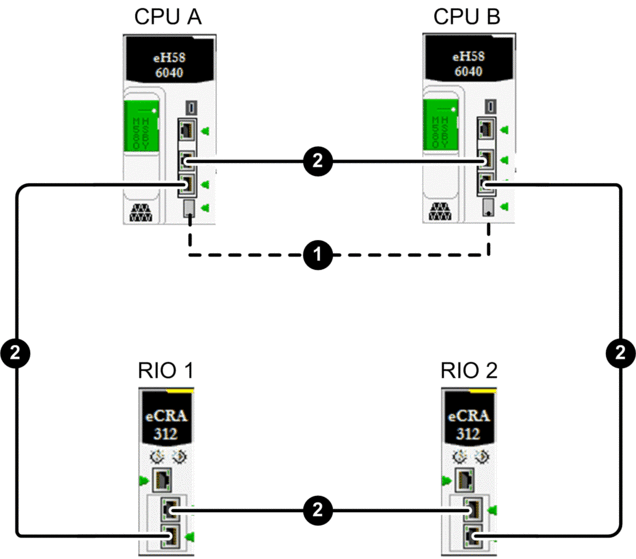
1 Hot Standby fiber optic link between CPU A and CPU B
2 Ethernet RIO main ring
In this example, CPU A and CPU B enter the following Hot Standby states:
If this Hot Standby system state arises during: |
CPU A and CPU B perform the following roles: |
|---|---|
Sequential start-up of CPU A and CPU B |
|
Simultaneous start-up of CPU A and CPU B |
|
Run-time |
|
Hot Standby Link is Not OK for both CPUs
In this example, the Hot Standby link is not operational in both directions, from CPU A to CPU B and from CPU B to CPU A. All other Hot Standby system connections are functioning:
Communication link |
CPU A |
CPU B |
|---|---|---|
Hot Standby link between CPU A and CPU B |
Not OK |
Not OK |
Ethernet RIO link between CPU A and CPU B |
OK |
OK |
Ethernet RIO connections between CPU and one or more (e)X80 EIO adapter modules |
OK |
OK |
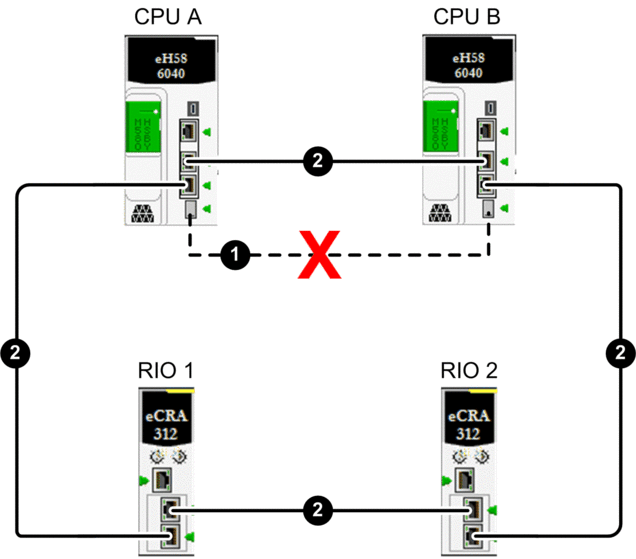
1 Hot Standby fiber optic link between CPU A and CPU B
2 Ethernet RIO main ring
X Indicates a broken communication link
In this example, CPU A and CPU B enter the following Hot Standby states:
If this Hot Standby system state arises during: |
CPU A and CPU B perform the following roles: |
|---|---|
Sequential start-up of CPU A and CPU B |
|
Simultaneous start-up of CPU A and CPU B |
|
Run-time |
|
Hot Standby Link is Not OK for One CPU and is OK for the Other CPU
In this example, a one-directional break exists in the fiber optic cable used to implement the Hot Standby link. CPU A receives transmissions from CPU B over the Hot Standby link, but CPU B does not receive transmissions from CPU A over the link. All Ethernet RIO connections are OK for both CPUs:
Communication link |
CPU A |
CPU B |
|---|---|---|
Hot Standby link between CPU A and CPU B |
OK |
Not OK |
Ethernet RIO link between CPU A and CPU B |
OK |
OK |
Ethernet RIO connections between CPU and one or more (e)X80 EIO adapter modules |
OK |
OK |
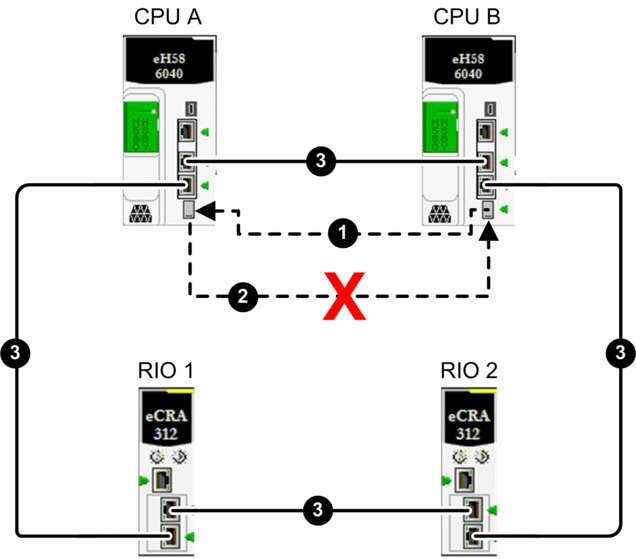
1 Operational Hot Standby fiber optic link from CPU B to CPU A
2 Broken Hot Standby fiber optic link from CPU A to CPU B
3 Ethernet RIO main ring
X Indicates a broken communication link
In this example, CPU A and CPU B enter the following Hot Standby states:
If this Hot Standby system state arises during: |
CPU A and CPU B perform the following roles: |
|---|---|
Sequential start-up of CPU A and CPU B |
|
Simultaneous start-up of CPU A and CPU B |
|
Run-time |
|
One Break Exists in the Ethernet RIO Main Ring
In this example, a single break exists in the Ethernet RIO main ring. Although the break occurs in the segment between the two CPUs, in this example, the break could be located at any point along the Ethernet RIO main ring (2). All other Hot Standby system connections are functioning:
Communication link |
CPU A |
CPU B |
|---|---|---|
Hot Standby link between CPU A and CPU B |
OK |
OK |
Ethernet RIO link between CPU A and CPU B |
OK1 |
OK1 |
Ethernet RIO connections between CPU and one or more (e)X80 EIO adapter modules |
OK |
OK |
1. RSTP calculates and implements a redundant path between CPU A and CPU B in case of a single break in the Ethernet RIO main ring. |
||
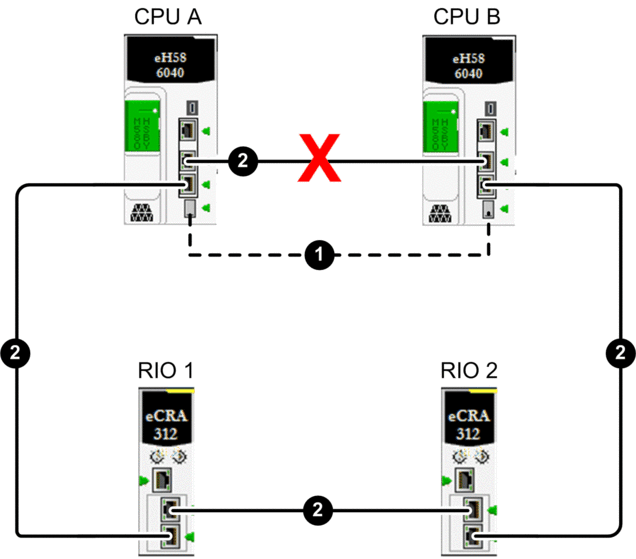
1 Hot Standby fiber optic link between CPU A and CPU B
2 Ethernet RIO main ring
X Indicates a broken communication link
In this example, CPU A and CPU B enter the following Hot Standby states:
If this Hot Standby system state arises during: |
CPU A and CPU B perform the following roles: |
|---|---|
Sequential start-up of CPU A and CPU B |
|
Simultaneous start-up of CPU A and CPU B |
|
Run-time |
|
Two Breaks in the Ethernet RIO Main Ring Isolate One CPU
In this example, two breaks in the Ethernet RIO main ring have the following effects:
The loss of the Ethernet RIO link between the CPUs.
The isolation of CPU A from the (e)X80 EIO adapter modules on the Ethernet RIO main ring.
The Hot Standby link remains operational.
Communication link |
CPU A |
CPU B |
|---|---|---|
Hot Standby link between CPU A and CPU B |
OK |
OK |
Ethernet RIO link between CPU A and CPU B |
Not OK |
Not OK |
Ethernet RIO connections between CPU and one or more (e)X80 EIO adapter modules |
Not OK |
OK |
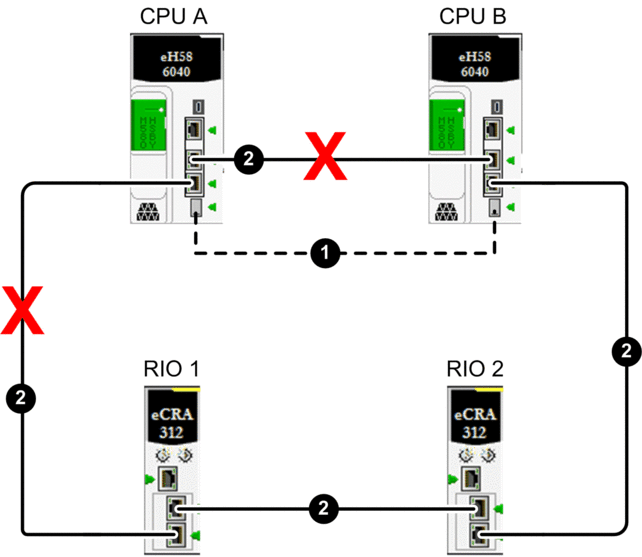
1 Hot Standby fiber optic link between CPU A and CPU B
2 Ethernet RIO main ring
X Indicates a broken communication link
In this example, CPU A and CPU B enter the following Hot Standby states:
If this Hot Standby system state arises during: |
CPU A and CPU B perform the following roles: |
|---|---|
Sequential start-up of CPU A and CPU B |
|
Simultaneous start-up of CPU A and CPU B |
|
Run-time |
|
Two Ethernet RIO Main Ring Breaks Cause CPUs to be Connected to Different Sets of Ethernet RIO Devices
In this example, two breaks exist in the Ethernet RIO main ring, causing the loss of the Ethernet RIO link between CPU A and CPU B. The location of the breaks cause each CPU to be connected to a different collection of (e)X80 EIO adapter modules on the Ethernet RIO main ring. The Hot Standby link remains operational:
Communication link |
CPU A |
CPU B |
|---|---|---|
Hot Standby link between CPU A and CPU B |
OK |
OK |
Ethernet RIO link between CPU A and CPU B |
Not OK |
Not OK |
Ethernet RIO connections between CPU and one or more (e)X80 EIO adapter modules |
OK |
OK |
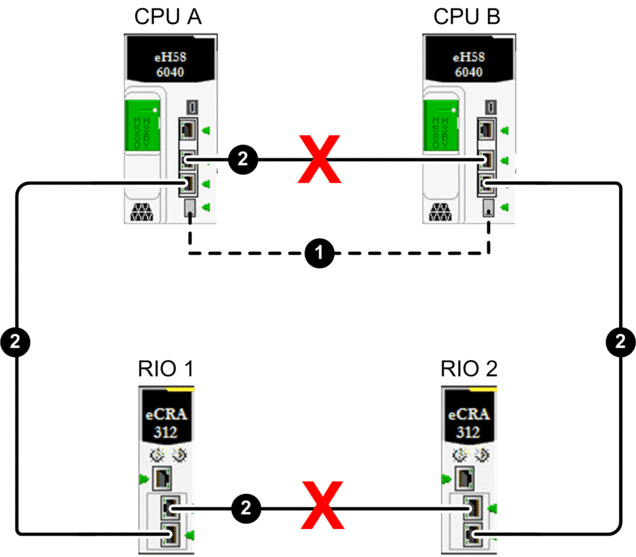
1 Hot Standby fiber optic link between CPU A and CPU B
2 Ethernet RIO main ring
X Indicates a broken communication link
In this example, CPU A and CPU B enter the following Hot Standby states:
If this Hot Standby system state arises during: |
CPU A and CPU B perform the following roles: |
|---|---|
Sequential start-up of CPU A and CPU B |
|
Simultaneous start-up of CPU A and CPU B |
|
Run-time |
|


